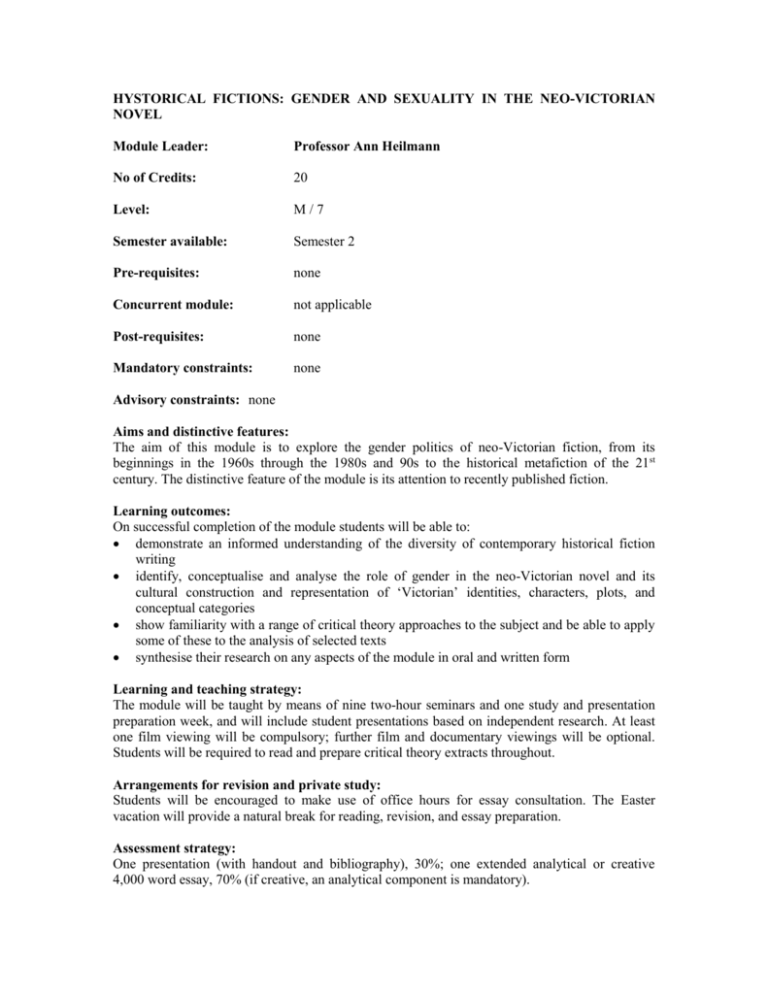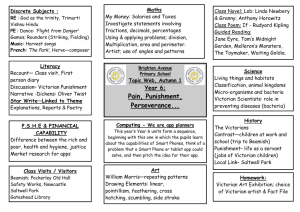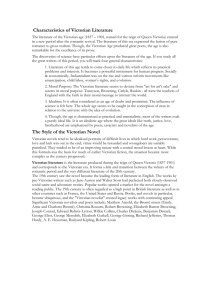Module Leader: Professor Ann Heilmann
advertisement

HYSTORICAL FICTIONS: GENDER AND SEXUALITY IN THE NEO-VICTORIAN NOVEL Module Leader: Professor Ann Heilmann No of Credits: 20 Level: M/7 Semester available: Semester 2 Pre-requisites: none Concurrent module: not applicable Post-requisites: none Mandatory constraints: none Advisory constraints: none Aims and distinctive features: The aim of this module is to explore the gender politics of neo-Victorian fiction, from its beginnings in the 1960s through the 1980s and 90s to the historical metafiction of the 21st century. The distinctive feature of the module is its attention to recently published fiction. Learning outcomes: On successful completion of the module students will be able to: demonstrate an informed understanding of the diversity of contemporary historical fiction writing identify, conceptualise and analyse the role of gender in the neo-Victorian novel and its cultural construction and representation of ‘Victorian’ identities, characters, plots, and conceptual categories show familiarity with a range of critical theory approaches to the subject and be able to apply some of these to the analysis of selected texts synthesise their research on any aspects of the module in oral and written form Learning and teaching strategy: The module will be taught by means of nine two-hour seminars and one study and presentation preparation week, and will include student presentations based on independent research. At least one film viewing will be compulsory; further film and documentary viewings will be optional. Students will be required to read and prepare critical theory extracts throughout. Arrangements for revision and private study: Students will be encouraged to make use of office hours for essay consultation. The Easter vacation will provide a natural break for reading, revision, and essay preparation. Assessment strategy: One presentation (with handout and bibliography), 30%; one extended analytical or creative 4,000 word essay, 70% (if creative, an analytical component is mandatory). Method of re-assessment: As above (presentation to be given to module leader) Indicative content: This module is premised on three critical concepts and the ways these are reflected and developed in contemporary fictions set in the Victorian period or re-envisioning Victorian texts and personalities: Elaine Showalter’s 1990s exploration of the history of the gendered narratives of hysteria; Adrienne Rich’s 1970s second-wave feminist notion of ‘revision – the act of looking back, of seeing with fresh eyes, of entering an old text from a new critical direction’ as constituting an ‘act of survival’ for women writers and readers; and Linda Hutcheon’s 1980s postmodernist concept of ‘historiographical metafiction’ as a form of narrative writing which explodes the boundaries between history (‘fact’) and fiction in order to reclaim ‘ex-centric’ voices brushed to the sidelines of official histories and to ‘render inextricable the public and the historical and the private and biographical’. Starting with the ‘classical’ pair Wide Sargasso Sea (Jean Rhys, 1966) and Jane Eyre (Charlotte Brontë, 1847), we will discuss revisionary sexual and psychoanalytical paradigms in modern rewritings of Victorian narratives (e.g. Sarah Waters’s Tipping the Velvet, 1998; Wesley Stace’s Misfortune, 2005; Belinda Starling’s The Journal of Dora Damage, 2006). A second and related category of texts to be discussed is pastiche: novels based on real-life figures and/or written in the style of an identifiable Victorian author; possible examples are the author Henry James in Colm Tóibín’s The Master (2004), the Brownings and their servants in A.S. Byatt’s Possession (1990), ‘The Conjugial Angel’ (Angels and Insects, 1995), and in Margaret Forster’s Lady’s Maid (1990); Oscar Wilde in Gyles Brandreth’s Oscar Wilde and The Candlelight Murders (2007); Canada’s most notorious female criminal in Margaret Atwood’s Alias Grace (1996); and/or various pastiches of Dickens and Collins. Thirdly, we will examine neo-Victorian metafictions which explore the gendered and sexed preoccupations of Victorian society, medicine, and science; texts may include A.S. Byatt’s ‘Morpho Eugenia’ (Angels and Insects, 1995), John Fowles’s The French Lieutenant’s Woman (1969), Sebastian Faulkes’ Human Traces (2005). Fourthly, we will examine to what extent the neo-Victorian supernatural and its preoccupation with doubles can be read as a metafictional comment on its own relationship to the Victorian; central to this discussion will be Christopher Priest’s The Prestige (1995) and its film version, and Sarah Waters’s Affinity (1999). The role of race and ethnicity – in texts such as Matthew Kneale’s English Passengers, J. G. Farrell’s The Siege of Krishnapur and Lloyd Jones’s Mister Pip - may also be examined. We will conclude with the neo-Victorian picaresque and/or (family) mystery novel, such as, for example: Angela Carter’s Nights at the Circus (1984), Sarah Waters’s Tipping the Velvet (1998), Wesley Stace’s Misfortune (2005), Michael Cox’s The Meaning of Night (2006), Jane Harris’s The Observations (2006), D.J. Taylor’s Kept (2006). Sessions may be devoted to some of the following: Hystorical Fictions and critical theory The neo-Victorian theme park; or why is neo-Victorian fiction so popular? Sisters and strangers: Charlotte Brontë, Jane Eyre and Jean Rhys, Wide Sargasso Sea Reconstructing the Victorian author in literature and film: John Fowles, The French Lieutenant’s Woman (separate film viewing mandatory); Henry James in Colm Tóibín’s The Master Darwinian narratives, patients and doctors: one or more of: A.S. Byatt, ‘Morpho Eugenia’; Sebastian Faulkes, Human Traces; Wesley Stace, Misfortune Conceptualizing crime: (female) delinquency and neo-Victorian Gothic: Margaret Atwood’s Alias Grace; Jane Harris, The Observations Hysteria and its discontents: Henry James, ‘The Turn of the Screw’, A.N. Wilson, A Jealous Ghost and/or The Others (2001) The Neo-Victorian supernatural: doubles and spectres: Kate Mosse’s Sepulchre, Christopher Priest’s The Prestige, Sarah Waters’s Affinity Reimagining eminent Victorians: The Brownings in A. S. Byatt’s ‘The Conjugial Angel’ and Margaret Forster’s Lady’s Maid Historical metafiction and generic hybridity: A. S. Byatt, Possession; Charles Palliser, Quincunx; D. J. Taylor, Kept Race, gender and ethnicity in the neo-Victorian novel: Matthew Kneale’s English Passengers, J. G. Farrell’s The Siege of Krishnapur and Lloyd Jones’s Mister Pip The neo-Victorian picaresque and (family) mystery novel: Angela Carter’s Nights at the Circus, Sarah Waters’s Tipping the Velvet, Michael Cox’s The Meaning of Night One week will be dedicated to independent study, followed by student presentations of independently researched and selected texts. Students will be expected to provide extracts of the texts they have chosen to discuss. Indicative bibliography: Texts will be selected from the following (steadily expanding) list: Ackroyd, Peter (1998) Dan Leno & The Limehouse Golem (London: Vintage) Atwood, Margaret (1997) Alias Grace (London: Virago) Barnes, Jonathan (2007) The Somnambulist (London: Gollancz) Barrett, Susan (2005) Fixing Shadows (London: Headline) Bayard, Louis (2003) Mr Timothy: A Dickensian Thriller (London: John Murray) Blake, Sarah (2000) Grange House: A Novel (New York: Picador) Brandreth, Gyles (2007) Oscar Wilde and The Candlelight Murders (London: John Murray) Brontë, Charlotte (1847) Jane Eyre (London: Penguin, 1985) or any other edition. Byatt, A. S. (1992) ‘A Conjugial Angel’, Angels and Insects (London: Chatto & Windus) Byatt, A. S. (1990) Possession (London: Vintage) Carter, Angela (1984) Nights at the Circus (London: Vintage) Clark, Clare (2005) The Great Stink (London: Penguin) Cox, Michael (2006) The Meaning of Night: A Confession (London: John Murray). Duncker, Patricia (1999) James Miranda Barry. Faber, Michael (2002) The Crimson Petal and the White (London: Canongate) Faber, Michael (2006) The Apple (Edinburgh: Canongate). Farrell, J. G. (1973) The Siege of Krishnapur (London: Phoenix) Faulkes, Sebastian (2005) Human Traces (London: Hutchinson) Forster, Margaret (1990) Lady’s Maid (London: Penguin) Fowles, John (1969) The French Lieutenant’s Woman (London: Panther) Gray, John MacLachlan (2004) The Fiend in Human: A Thriller (London: Arrow) Gray, John MacLachlan (2006) White Stone Day (London: Arrow) Harris, Jane (2006). The Observations (London: faber and faber). Harwood, John (2005) The Ghost Writer (London: Vintage) Hill, Susan (1998) The Woman in Black (London: Vintage) Hill, Susan (1999) The Mist in the Mirror (London: Vintage) Hill, Susan (2007) The Man in the Picture (London: Profile Books) James, Henry (1898) The Turn of the Screw. Any edition. Online edition: http://etext.virginia.edu/toc/modeng/public/JamTurn.html Jones, Lloyd (2006) Mister Pip (London: John Murray) Kneale, Matthew (2000) English Passengers (London: Penguin). Markovits, Benjamin (2007) Imposture (London: faber and faber) Mason, Daniel (2002) The Piano Tuner: A Novel (London: Picador) Mosse, Kate (2007) Sepulchre (London: Orion) Myerson, Julie (2005) Laura Blundy (London: Harper Perennial). Palliser, Charles (1989) Quincunx (London: Penguin). Palliser, Charles (1999) The Unburied (London: Phoenix) Poster, Jem (2002) Courting Shadows (London: Sceptre) Priest, Christopher (1995) The Prestige (London: Gollancz) Redhill, Michael (2007) Consolation (London: William Heinemann) Rhys, Jean (1966) Wide Sargasso Sea (London: Penguin) Stace, Wesley (2005) Misfortune (London: Vintage) Starling, Belinda (2006) The Journal of Dora Damage (London: Bloomsbury) Stephenson, Neal (1995) The Diamond Age (London: Picador) Taylor, D. J. (2006) Kept: A Victorian Mystery (London: Chatto and Windus) Tóibín, Colm (2004) The Master (London: Picador) Waters, Sarah (1999) Tipping the Velvet (London: Virago) Wilson, A.N. (2005) A Jealous Ghost (London: Hutchinson). Wilson, James (2001) The Dark Clue (London: Faber and Faber). Selected critical reading Foucault, Michel (1991) The Foucault Reader, ed. Paul Rabinow (London: Penguin) Gilmour, Robin (2000) ‘Using the Victorians: the Victorian Age in Contemporary Fiction’, in Alice Jenkins and Juliet John, eds. Rereading Victorian Fiction. Basingstoke: Palgrave, pp.189-200. Gutleben, Christian (2001) Nostalgic Postmodernism: The Victorian Tradition and the Contemporary British Novel. Amsterdam: Rodopi. Heilmann, Ann and Mark Llewellyn, eds (2007) Metafiction and Metahistory in Contemporary Women’s Writing. Basingstoke: Palgrave Macmillan. Higdon, David Leon (1984) Shadows of the Past in Contemporary British Fiction. Basingstoke: Macmillan. Hutcheon, Linda (1989) ‘“The Pastime of Past Time”: Fiction, History, Historiographical Metafiction’, The Politics of Postmodernism (London: Routledge). Also in Michael J. Hoffham and Patrick D. Murphy, eds (1996), Essentials of the Theory of Fiction (Leicester: Leicester University Press), pp. 473-95. Johnsen, Rosemary Erickson (2006) Contemporary Feminist Historical Crime Fiction. Basingstoke: Palgrave. Kaplan, Cora (2007) Victoriana: Histories, Fiction, Criticism. Edinburgh: Edinburgh University Press. King, Jeannette (2005) The Victorian Woman Question in Contemporary Fiction. Basingstoke: Palgrave Macmillan. Kohlke, Marie-Luise (2006) ‘The Neo-Victorian Sexsation: Literary Excursions into the Nineteenth-Century Erotic’, , in Inter-Disciplinary.Net eBook of Proceedings of the 3rd Global Conference on Sex and Sexuality: Exploring Critical Issues, Krakow, 29 November - 2 December 2006; available electronically at: http://www.interdisciplinary.net/ci/sexuality/s3/Kohlke%20paper.pdf Kucich, John and Dianne F. Sadoff, eds (2000) Victorian Afterlife: Postmodern Culture Rewrites the Nineteenth Century. Minneapolis: University of Minnesota Press. Lowenthal, David (1985) The Past is a Foreign Country. Cambridge: Cambridge University Press. Pieters, Jürgen (2005) Speaking with the Dead: Explorations in Literature and History. Edinburgh: Edinburgh University Press. Rich, Adrienne (1971) ‘When We Dead Awaken: Writing as Re-vision’, in Barbara Charlesworth Gelpi and Albert Gelpi, eds (1975) Adrienne Rich’s Poetry (New York: Norton), pp. 90-98. Showalter, Elaine (1987) The Female Malady: Women, Madness and English Culture, 1830-1980 (London: Virago, 1987) Showalter, Elaine (1997) Hystories: Hysterical Epidemics and Modern Culture (London: Picador), chapters 2-5. Taylor, Miles and Michael Wolff, eds (2004) The Victorians since 1901: Histories, Representations and Revisions. Manchester: Manchester University Press. Wallace, Diana (2005) The Woman’s Historical Novel: British Women Writers, 1900-2000. Basingstoke : Palgrave Macmillan. White, Hayden (1990) Tropics of Discourse: Essays in Cultural Criticism (Baltimore and London: The Johns Hopkins University Press; first published 1978). Widdowson, Peter (2006) ‘“Writing back”: contemporary re-visionary fiction’, Textual Practice, vol. 20: 3, pp.491-507.







